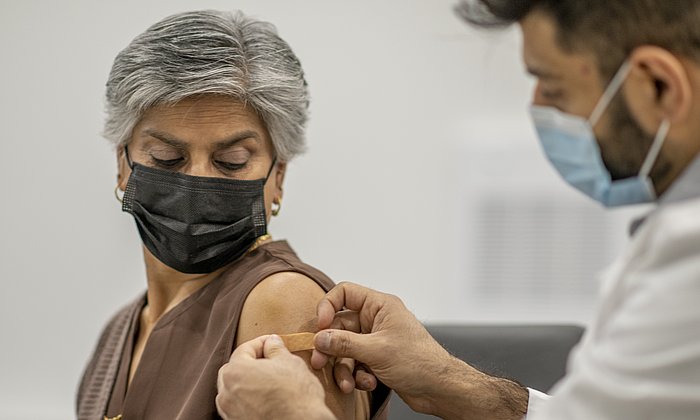More than 80 percent efficacy in prevention of serious illness through Covid-19
Antibody treatment for Covid-19

The new form of treatment has proven highly effective against severe Covid-19 illness above all in persons with chronic conditions who do not respond sufficiently to an active vaccination.
“With approval by the European Medicines Agency (EMA) on November 12, the neutralizing antibodies can now be widely used at an early stage of the illness,” said adjunct teaching professor Dr. Christoph Spinner, infectious disease specialist and pandemic officer at Klinikum rechts der Isar, and his colleague, adjunct teaching professor Dr. Jochen Schneider, who heads the new Covid-19 outpatient clinic for monoclonal antibody treatment at the same hospital.
New treatment soon to be widely available
With the current surge in patient numbers, especially in Bavaria, the experts believe that this treatment can benefit many people and should therefore be made widely available as quickly as possible.
“To make that happen, we will be happy to share our skills and experience from a university clinic with colleagues at other hospitals in the fight against the pandemic,” says Dr. Spinner.
Antibodies stop virus from multiplying in the body
The treatment basically consists of highly specialized antibodies that act as a “passive vaccination”. Dr. Spinner explains: “Neutralizing antibodies produced in the lab can deactivate – basically checkmate – the SARS-CoV-2 virus.”
It can be injected intravenously or subcutaneously – in other words, under the skin. The antibodies fight viruses by preventing them from entering cells. This stops them from multiplying. But according to experts, it is crucial for patients to receive the antibodies within seven days of the onset of symptoms, either as outpatients or while hospitalized. Only then can the treatment achieve its full potential.
Consequently, it is no longer beneficial if used later. Studies have shown that it is no longer the SARS-CoV-2 virus itself, but rather the overreacting immune system that causes the serious cases. “Patients tolerate the one-time dose of this treatment very well,” says Dr. Schneider. “Significant side effects are extremely rare.”
“Passive vaccination” may also be provided as preventive care
Especially people with chronic conditions or immune deficiencies can benefit greatly from the antibody treatment because they often show a weak response to an active vaccination, but still have a high risk of serious illness in case of a Covid-19 infection. “The new treatment is over 80 percent effective against serious cases,” says Dr. Spinner. It is a passive injection because antibodies produced in the lab are injected into the body.
It can even be used as a preventive treatment or immediately after contact with SARS-CoV-2, which can be an important protection for persons with chronic conditions. A specific example: a high-risk patient is living in the same household with someone who tests positive. However, regulatory changes are needed before the treatment can be used on a preventive basis.
Karagiannidis, Christian; Lang, Katharina; Mikolajewska, Agata; Malin, Jakob J.; Kluge, Stefan; Spinner, Christoph D.: Treatment and prevention: antibodies against COVID-19 (in German). Dtsch Arztebl 2021; 118(47): A-2212 / B-1825
Antibody Center (in German) – Internal Medicine II at Klinikum rechts der Isar in Munich
Technical University of Munich
Corporate Communications Center
- Andrea Eppner (MRI) / Dr. Katharina Baumeister (TUM)
- presse@tum.de
- Teamwebsite
Contacts to this article:
PD Dr. med. Christoph Spinner
Klinikum rechts der Isar at
Technical University of Munich (TUM)
Chief Resident
Chief Medical Information Officer (CMIO)
christoph.spinner@mri.tum.de

